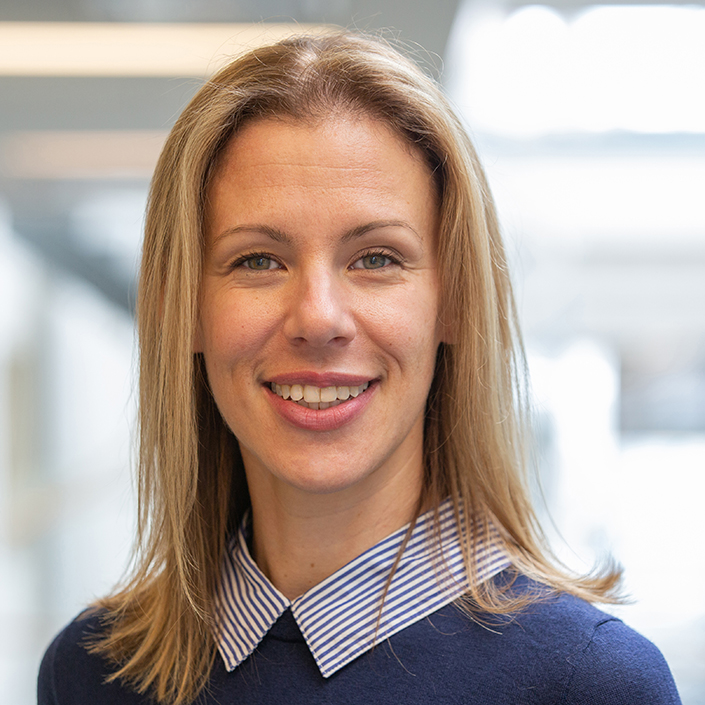Emily Mower Provost named first CSE Associate Chair for Graduate Affairs

Associate professor Emily Mower Provost has been named the first Associate Chair for Graduate Affairs, a new leadership position in CSE charged with expanding efforts to improve graduate programs and student experience. As Associate Chair, Mower Provost will oversee efforts such as curricular improvement, community building, and the streamlining of important processes in the PhD and Master’s student pipelines.
Mower Provost begins her new Associate Chair position following two years as the faculty chair of CSE’s Graduate Program Committee, which focused on the PhD program opposite the MS Program Chair. During her tenure, she placed an emphasis on policy design that cut down on student uncertainty.
“We needed a very transparent set of policies, ” she says, “so students could feel confident they were getting accurate information from a central source. We’re also moving towards new policies and processes that are informed by student experiences and expectations.”
To the latter end, Mower Provost explains, a significant change was made to how PhD students form their dissertation committees. While previously committee formation was tied to the thesis proposal process, students can now form a committee early on and save their formal proposal for later. This was a response to anxieties described by students associated with needing to have a polished proposal too early in their research work. The intent of the old policy, Mower Provost says, was to have students meet and work with their committee from very early on in the research process, but it was being confounded by the need for a finished proposal.
“Now you can actually get feedback and support early on in the process before completing your proposal,” she says. Through adjustments like these, Mower Provost hopes to uproot unnecessary barriers to student support and collaboration.
Additionally, Mower Provost oversaw an overhaul of PhD program documentation. Two key documents that came of this effort are the Current PhD Student Information hub, which breaks down the entire degree experience by major milestones, and a detailed guide to changing PhD advisors.
“We wanted to produce a document that was more than an outline of the process,” she explains, “we also wanted to acknowledge what could be stressful about it, and outline best practices for both the student making the move and the group members they would be joining.” Both documents were assembled with extensive input from students and faculty.
Mower Provost also led the construction of a faculty mentoring plan system. As of academic year 2021-2022, nearly all tenure-track CSE faculty publish insights into their advising style and workplace expectations. The goal, Mower Provost explains, was to give students more concrete expectations about things like work-life balance, deadlines, and working styles in any labs that interested them.
“We wanted to give students a way to understand faculty vision,” she says. “The aim is to give faculty a structured way to communicate about how their labs operate, that’s available to all prospective and current students.”
Other efforts in CSE to bolster support for PhD students include expansion of the Introduction to Graduate Studies course (EECS 601), led by Profs. Alanson Sample and David Fouhey in close collaboration with several guest lecturers. PhD students also have access to a new professional coaching initiative led by Magda Calvillo, who leads both individual and group sessions for PhD students seeking professional advancement and community. The recent changes are rounded out by minor curricular changes and the addition of anonymous feedback mechanisms for course evaluations, according to Mower Provost.
As Associate Chair for Graduate Affairs, the scope of Mower Provost’s work will expand to include CSE’s Master’s programs, in collaboration with other faculty members of the Graduate Program and MS Program Committees. Mower Provost is especially looking forward to helping Master’s students feel more welcome and integrated into the CSE community, she says.
“I’m looking forward to getting a better understanding of the student experiences in our Master’s programs, what kinds of support structures they are lacking that we can improve upon,” says Mower Provost. “I want to develop the same social events that are available to undergrads and PhD students, and also determine what needs are specific to this group.”
One feature of her work that Mower Provost intends to emphasize in the new role is the steady inflow of student feedback that accompanied any proposed changes.
“Proactively soliciting student input and feedback is becoming part of the department’s culture,” she says. “I want the expectation to be that you’ll work with students to figure out how to make changes, evaluate our processes, and clarify what we value.”
Mower Provost begins her work as the Associate Chair for Graduate Affairs in September, 2022.
“The thing I’m really excited about,” Mower Provost says, “is that, when we’ve explored policy and process changes in CSE, the attitude so far has been ‘Yes, and’ rather than ‘No, but.’ Students and faculty here have an attitude for change, and an attitude for growth.”

 MENU
MENU 
